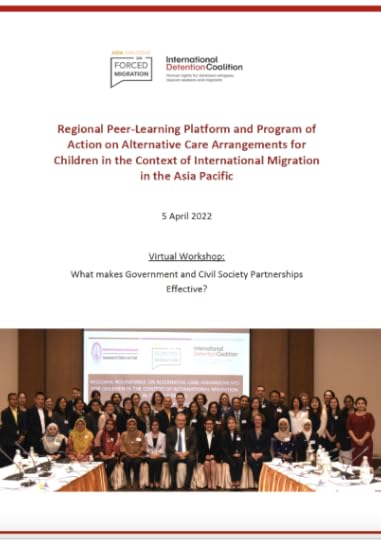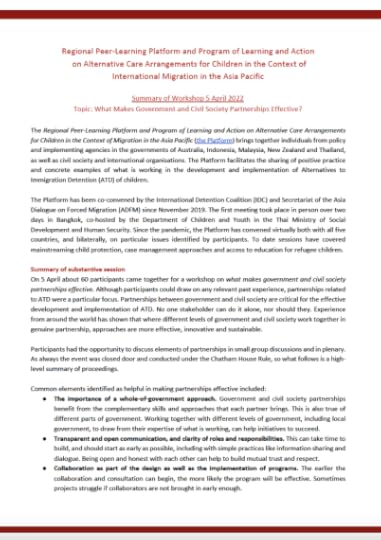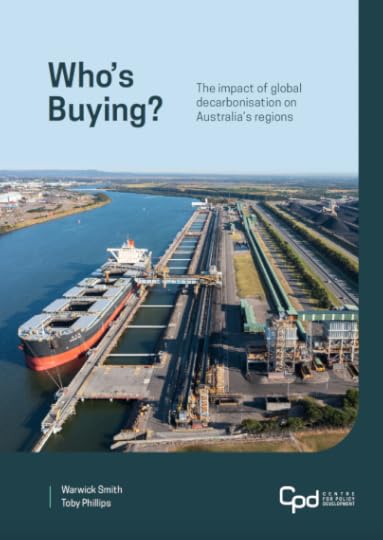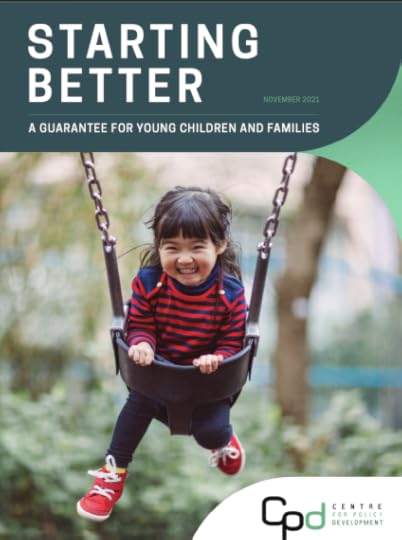Centre for Policy Development's Blog, page 13
April 27, 2022
Eleventh meeting | ASIA DIALOGUE ON FORCED MIGRATION | March 2022
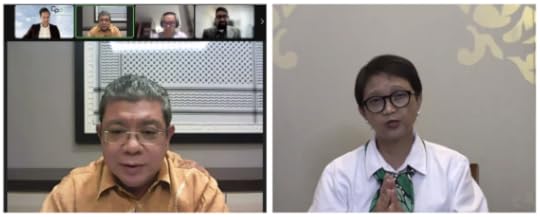
Key documents for the eleventh ADFM meeting:
Full agenda and participant list Participant profiles Meeting summaryOn 24 March 2022 the Asia Dialogue on Forced Migration (ADFM) convened virtually for part one of its eleventh meeting.
The meeting focused on opportunities for reform of the Bali Process on People Smuggling, Trafficking in Persons and Related Transnational Crime (Bali Process) on its twentieth anniversary this year. The ADFM has worked closely with the Bali Process since its inception in 2015 to strengthen the multilateral body’s ability to address forced migration in the Indo Pacific. This includes considerable work in 2016 following the Andaman Sea crisis.
The March meeting was an opportunity to come together to discuss the proposals and opportunities to reform the Bali Process to allow it to better enhance regional cooperation on forced migration issues.
We were delighted to welcome the distinguished Foreign Ministers of Indonesia and Malaysia to the meeting to provide opening remarks, as well as senior government officials from eight countries, international organisations and civil society representatives.
There was general enthusiasm and support in the meeting for reform of the Bali Process to enable it to be more responsive and adaptive to the evolving challenges of forced migration in our region. Participants emphasised that ongoing crises in Afghanistan, Myanmar and most recently Ukraine underscore the importance of not only responding to crises as they occur but being prepared for future events.
A high-level summary of the meeting outlines the key themes of discussion, as well as recommendations which received particular support. These include prioritising early warning capabilities through the Taskforce on Planning and Preparedness (TFPP), investing in technical capabilities and less formal meetings in order to make the most of the Bali Process’s strengths in capacity-building, strengthening and clarifying the mandate of the Regional Support Office (RSO) streamlining existing work streams and groups, based on a stocktake of what members most value and elevating engagement with other regional bodies including ASEAN and BIMSTEC , and also the private sector through the Government and Business Forum (GABF).
As a result of the meeting, the ADFM Secretariat has agreed to take the following actions:
Begin work on a stocktake of the Bali Process to determine the most effective structures and working groups going forward, ahead of the twentieth anniversary.Further develop the recommendations which received particular support and elaborate on how these could be practically implemented.Convene a follow up virtual ADFM meeting in June to discuss regional trends in forced migration and what more can be done collectively to respond including bilaterally and mini-laterally.Conduct a strategic assessment of regional priorities for forced migration responses over the next 5-10 years, including the role of the Bali Process.The ADFM Secretariat will be in touch with participants individually about these next steps. We welcome ideas for collaboration or further engagement on any of these actions.
The post Eleventh meeting | ASIA DIALOGUE ON FORCED MIGRATION | March 2022 appeared first on Centre for Policy Development.
Climate & Recovery Initiative Roundtable Eight
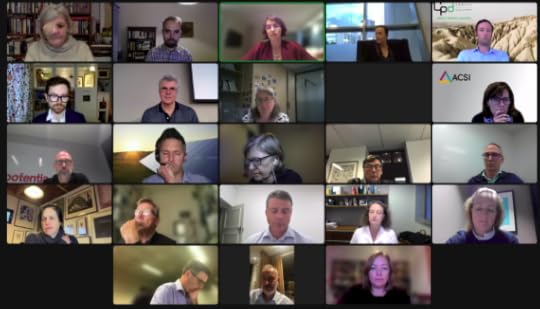
Climate and Recovery Initiative roundtable eight was convened virtually on Wednesday 27 April 2022.
Participants discussed the impact of conflict in Europe on energy markets and transition pathways, corporate views on global trends in decarbonisation, the role of infrastructure in climate resilience and orderly transition pathways for Australia’s regional economies.
Held three weeks after the release of the IPCC’s Working Group III report, participants from across business, government and civil society discussed the key risks and impacts for Australia identified in the report.
Professor Mark Howden, Director of the ANU Institute for Climate, Energy & Disaster Solutions and vice-chair of the Intergovernmental Panel on Climate Change (IPCC) addressed roundtable on the implications of the report’s findings.
The impact of global decarbonisation on jobs in the fossil fuel dependent regions of Australia explored by CPD’s Who’s buying? was also discussed.
In line with the custom of the Climate and Recovery Initiative, this discussion was held under the Chatham House Rule.
About the Climate and Recovery InitiativeThe Climate and Recovery Initiative (CRI) is a collaborative initiative coordinated by the Centre for Policy Development (CPD) and Climateworks Centre, with a steering group that includes Pollination Group, Australian Industry Group (AiGroup) and the Australian Council of Trade Unions (ACTU).
Working together, we are seeking to identify the best ideas and opportunities for aligning Australia’s economic recovery with climate and transition priorities, and to get them into the right hands. Our stakeholder roundtable series brings together trusted leaders, experts and advisers from business, regulation, policy and the community to consider the challenges and opportunities ahead.
In line with the custom of the Climate and Recovery Initiative, this discussion was held under the Chatham House Rule.
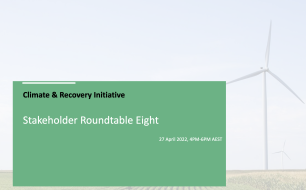 DOWNLOAD THE EIGHTH CLIMATE AND RECOVERY INITIATIVE ROUNDTABLE PARTICIPANT PACK
DOWNLOAD THE EIGHTH CLIMATE AND RECOVERY INITIATIVE ROUNDTABLE PARTICIPANT PACK The post Climate & Recovery Initiative Roundtable Eight appeared first on Centre for Policy Development.
April 26, 2022
Virtual Workshop on What Makes Government and Civil Society Partnerships Effective | 5 April 2022
On 5 April 2022 the Secretariat of the Asia Dialogue on Forced Migration (ADFM) was pleased to co-convene a virtual workshop with the International Detention Coalition (IDC) as part of our ongoing Regional Peer-Learning Platform and Program of Learning and Action on Alternatives to Detention of Children.
The workshop was the fourth virtual regional workshop convened as part of the Platform, since the impacts of the pandemic have prevented meeting in person since the kick-off event in November 2019.
Around 60 people came together from operational and policy agencies in governments in Australia, Indonesia, Malaysia, New Zealand and Thailand, as well as national and international civil society groups. Although participating countries all have unique national contexts, the discussions found many opportunities to learn from each other.
The theme of the workshop – what makes government and civil society partnerships effective – was the most popular theme proposed by participants for discussion. Partnerships between government and civil society are critical for the effective development and implementation of alternatives to child detention. No one stakeholder can do it alone, nor should they. Experience from around the world has shown that where different levels of government and civil society work together in genuine partnership, approaches are more effective, innovative and sustainable.
During the workshop in both small groups and plenary, participants shared examples of partnerships they had been involved in and elements that made them effective. These included open and honest communication, clarity of roles and responsibilities, appointing a designated coordinator, having a whole of government approach and collaborating in both the design of the program as well as its implementation.
We look forward to continuing to build the Regional Peer-Learning Platform alongside the IDC, and hope to be in a position to bring participants together in person again before too long.
Key documents and related reading
Asia Dialogue on Forced Migration
Regional Roundtable on Alternatives to Child Detention | 21-22 Nov 2019 | Bangkok
The post Virtual Workshop on What Makes Government and Civil Society Partnerships Effective | 5 April 2022 appeared first on Centre for Policy Development.
April 4, 2022
CPD is hiring a Finance Officer
About the role
The Centre for Policy Development is looking for a Finance Officer. Working closely with CPD’s Chief Operations Officer, the successful candidate will be responsible for day-to-day accounts management, financial reporting, budgeting and forecasting for the organisation. This is an exciting opportunity to join one of Australia’s leading public policy research institutes.
About CPD
The Centre for Policy Development is one of Australia’s leading independent policy institutes. Founded in 2007, we are a mission-driven organisation led by a dynamic CEO and distinguished Board of Directors, and we are seeking exceptional talent to join our growing team.
You will be joining a smart, energetic, dedicated team at an organisation with a collaborative culture that will foster your skills, broaden your horizons and engage your passion for ideas.
Role description
This is an ideal role for a motivated early graduate who is looking to build skills in the not-for-profit and public policy sector. You will be joining a smart, energetic, dedicated team at an organisation with a collaborative culture that will foster your skills, build your career and broaden your horizons.
The successful candidate will be Sydney based in our CBD office. Remuneration for the position will be determined based on the experience of the selected candidate. Other employee benefits include a flexible workplace, free barista coffee weekday mornings, end-of-trip facilities, bike storage.
Main duties and responsibilities
Desire to improve financial systems, automation and reporting, and to contribute to continuous improvement of financial systems, processes and procedures.Assist in drafting reports for CEO, Finance Committee and Board.Processing payments, invoicing, receipts, payroll and month-end reconciliations of CPD’s accounts.Assist with preparation and planning of annual budget and tracking and reviewing across the financial year.Assist with the annual audit.Assist with budgeting and financial reporting for research proposals and acquittals.Perform financial analysis including forecasting.Essential selection criteria
Bachelor’s degree in finance, accounting, or relevant field.Knowledge of financial regulations and accounting processes.Experience with MYOB essentialExperience with Xero desired.How to Apply
Candidates can apply via email to admin@cpd.org.au by 9.00am AEST on Tuesday 19 April 2022. Applications should include a cover letter (describing the applicant’s interest and suitability against this job description), and a CV.
The Centre for Policy Development is committed to being a diverse and inclusive workplace. We encourage applicants of all backgrounds, cultures, genders, abilities and experiences to apply.
You can also download the position description as a PDF here.
The post CPD is hiring a Finance Officer appeared first on Centre for Policy Development.
February 20, 2022
Leadership Transition – Centre for Policy Development
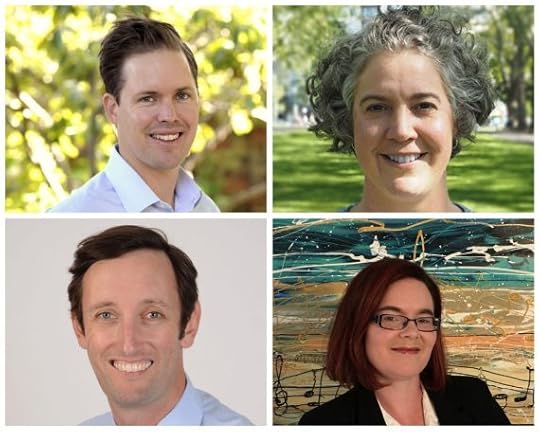
The Centre for Policy Development has today announced that Travers McLeod will be stepping down from the position of CEO at the end of March to take on the role of Executive Director with the Brotherhood of St Laurence. Travers will remain part of CPD as a Senior Fellow.
In his eight years in the role, Travers has been at the forefront of the creation and implementation of our unique Create-Connect-Convince method, which accompanied a significant expansion of the CPD team, deepening our national and regional policy impact across a broad range of issues.
In line with our succession planning, the CPD board has appointed current International Director Andrew Hudson to the role of Acting CEO, formally commencing on March 31.
Andrew has more than 25 years of leadership experience in the social change movement having worked across the private sector, government, the UN and other NGOs. He has been CPD’s international director since he returned home to Australia from New York in early 2021. Before this he was CEO of global NGO Crisis Action where he led 50 staff across 11 countries.
Andrew will be supported by Annabel Brown who has been appointed to the position of Acting Deputy CEO, and Dr Allison Orr who will take on the role of Chief Operating Officer.
Annabel and Allison have been core members of CPD’s leadership structure for many years. Annabel has more than two decades of values-driven public policy experience, and has been central to the ongoing development of CPD’s method. As Operations Director, Allison’s work in driving the CPD operational evolution has been pivotal to our growth.
The CPD board is united in its confidence that the leadership team will deliver the organisation’s vision to address long-term challenges for a fair, inclusive and prosperous future for Australia. The careful succession planning and richness of talent in the organisation has allowed the appointment of a leadership team from within, to affect a seamless transition.
Travers will work closely with Andrew, Annabel and Allison to ensure a smooth handover.
The CPD board and team would like to express its sincere and profound thanks to Travers for his leadership, welcome him to the role of Senior Fellow, and wish him all the very best in his leadership of the Brotherhood of St Laurence.
Media ReleaseBoard StatementThe post Leadership Transition – Centre for Policy Development appeared first on Centre for Policy Development.
February 6, 2022
VIDEO: Starting Better Launch – Centre for Policy Development
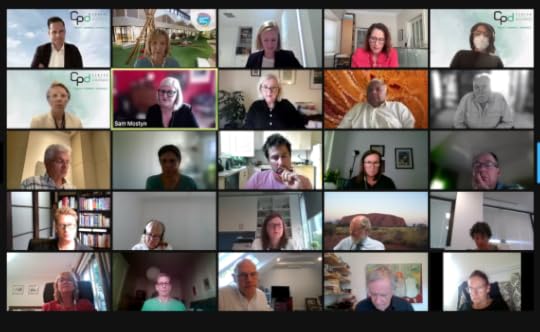
CPD and Parliamentary Friends of Early Childhood hosted the virtual industry launch of Starting Better: A Guarantee for Young Children and Families on Monday 7 February.
Attended by by more than 100 early childhood sector leaders, policymakers, philanthropists, elected officials and academics, the event provided the opportunity for participants to discuss how we make reform of Australia’s early childhood system a national priority.
Released in November last year, Starting Better resulted from extensive research and consultation in our Early Childhood Development Initiative and proposed a Guarantee for Young Children and Families that would entitle every child in Australia and their family to:
Three days free or low-cost quality early education from birth until school, with more days available at minimal cost. This begins as soon as families need it. This means all children will experience the lifelong benefits of quality early education
More paid parental leave, shared between partners. This will give babies time with their parents in the crucial first year of life, and it will give families the confidence to balance work and home more easily and equally
Support for children and parents from within their community, including up to 25 visits from maternal and child health nurses.
Starting Better was launched by National Children’s Commissioner Anne Hollonds, who spoke to 9 Newspapers ahead of the event to call for systemic reform to make Australia the best place in the world to be a child, and to raise one.
There was also a moderated panel discussion led by Early Childhood Development Council co-chair & CPD Fellow Leslie Loble, with attendees hearing from:
Sarah Hunter, Managing Director, OfficeworksTom Calma AO, Co-Chair of the Australian Literacy and Numeracy Foundation & Chancellor of the University of CanberraSam Mostyn AO, President, Chief Executive WomenJulia Davison, CEO, GoodstartPanelists were asked for their reflections on ‘Why a guarantee for young children and families should be a priority for Australia in 2022’.
Starting Better Industry Launch Starting Better - Children have their say News about the launch of Starting Better: A Guarantee for Young Children and Families:The Sydney Morning Herald on the call for cabinet to make kids a priority
The post VIDEO: Starting Better Launch – Centre for Policy Development appeared first on Centre for Policy Development.
January 30, 2022
Who’s buying? – Centre for Policy Development
Who’s buying? The impact of global decarbonisation on Australia’s regions is a report from the Centre For Policy Development’s Sustainable Economy Program that models the impact of global decarbonisation commitments on employment and output at a Local Government Area (LGA) level in Australia.
Key FindingsGlobal decarbonisation could affect around 300,000 Australian jobs connected to coal, oil and gas exports by 2050A handful of Local Government Areas bear the brunt of this impact – ten LGAs are predicted to account for around a third of all affected jobs Global decarbonisation is a predictable, manageable, long-term industrial transition; these estimates are based on projections of global demand for fossil fuels in 2050With active transition planning, these communities should be able to thrive in a post-carbon economyThe world in 2050 will be vastly different to the world today, with many new industries and opportunities Australia can make the choice now to diversify our economy and change
gear to capture the opportunities created by decarbonisation.
Who’s buying? models and analyses the locked-in and likely impact of global decarbonisation efforts by Australia’s trade partners on domestic fossil fuel export jobs. As nations pursue accelerated decarbonisation pathways after COP26, the choices Australia makes today can allow us to make sure the people and communities most affected by changing exports lead the charge for opportunities, jobs and projects in new industries.
As the global demand for coal is predicted to dramatically decrease in the coming decades – with conservative modelling suggesting a 50% drop by 2050, and more aggressive models plotting an even sharper decline – Australian jobs in the fossil fuels sector will be particularly exposed to this shift in global energy consumption.
The report calls for “laser-focused” local jobs deals between industry, government, investors, workers’ representatives and community leaders to connect communities in the Bowen Basin, Hunter and Pilbara with new opportunities that will be created in diverse industries such as mining, services, manufacturing, wind, hydrogen and renewables.
Who’s buying? uses an input-output model to chart the effects of this shift on the Australian labour market, drilling into the impacts in each industry in each LGA. What it finds is that between 100,000 and 300,000 Australian jobs — representing around two percent of the overall labour market — and $50 billion (in 2020 dollars) of annual output will be impacted. While modest at a national level, just ten LGAs are predicted to account for around a third of these exposed jobs, and almost half of total estimated output loss. These LGAs are primarily located in central Queensland’s Bowen Basin, the Upper Hunter in NSW, and the Pilbara in Western Australia.
As Australia’s main trading partners look toward a post-carbon economy, the time for policy makers to respond to this inevitable global trend is now.
Download Who's buyingAt A GlanceMedia Release Who’s buying? in the media AFR and ABC both covered the release of the reportToby Phillips appeared on ABC AM to discuss the report’s findingsIt was also covered by AAP, Business Insider Australia and RenewEconomy .The post Who’s buying? – Centre for Policy Development appeared first on Centre for Policy Development.
November 23, 2021
Seventh Climate & Recovery Initiative stakeholder roundtable
The seventh roundtable of the Climate and Recovery Initiative, on Friday 19 November 2021, was held directly after a public forum on Climate, Capital Markets and Global Governance. The UNFCCC COP26 concluded just days beforehand with a global call for increased ambition; participants in the roundtable were eager to discuss what the next phase of action would look like in Australia.
Leaders from government, business, and civil society were joined by special guests from the preceding public forum: Steven Kennedy, Secretary of the Australian Treasury, and Shemara Wikramanayake, CEO of Macquarie Bank, to reflect on developments on climate change in Australia. Participants acknowledged the opportunities and challenges ahead and the need to coordinate in taking action against climate change.
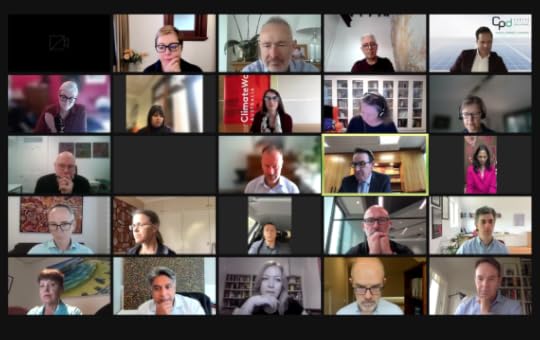
The CRI was established in May 2020 to align Australia’s recovery from the COVID-19 pandemic with a transition to net zero carbon emissions. The Initiative is coordinated by the Centre for Policy Development (CPD) and ClimateWorks Australia, with a steering group that includes the Australian Industry Group (Ai Group), the Australian Council of Trade Unions (ACTU), and Pollination. Since its establishment, the initiative has consistently put at the forefront the need for Australia – governments, private sector and individuals – to respond to and join the efforts towards global decarbonisation.
The group was optimistic about the progress made at COP26 and the actions taken by various governments and organisations to speed up the fight against climate change. With hydrogen identified as a major energy source at COP26, the group saw an opportunity for Australia to be a major exporter – although not without global competition. While the hard work of agreeing a common 2050 goal is done, it must translate into actions. Participants were glad to see bipartisanship on long-term goals, but the private sector can only take short-term actions if supported by governments.
After the discussion, the group identified new areas to focus on, with private, state and federal government coordination being the most likely option as a focus area.
Further information on the roundtable, including an agenda, participants and discussion points, is available in the meeting pack below.
Key Documents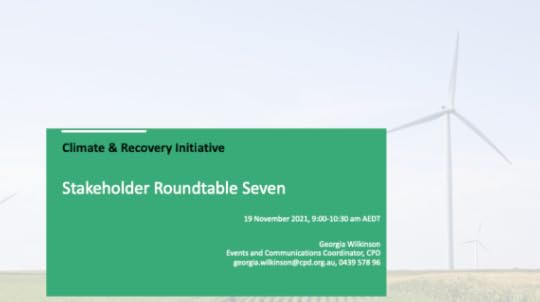
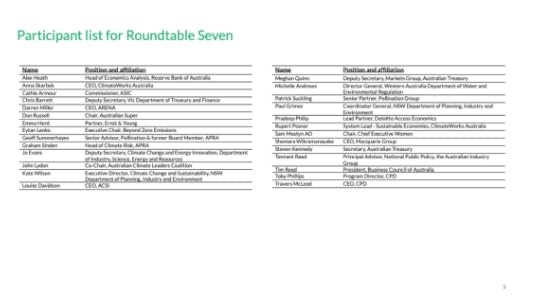 Roundtable Seven Meeting Pack Participant List
Roundtable Seven Meeting Pack Participant List
Related ReadingClimate and Recovery InitiativeCRI Public Forum, ‘Climate, Capital Markets and Global Governance’
The post Seventh Climate & Recovery Initiative stakeholder roundtable appeared first on Centre for Policy Development.
November 21, 2021
Starting Better – Centre for Policy Development
Starting Better: A guarantee for young children and families, is major report from the Centre For Policy Development.
It draws on extensive consultation and research from the first year of our Early Childhood Development Initiative, including the work of the Early Childhood Development Council, an informal intergovernmental body comprising senior officials from all jurisdictions, ECD experts and sector leaders.
Starting Better proposes a Guarantee for Young Children and Families – a new pillar of Australia’s social deal that entitles every child in Australia and their family to:
Three days free or low-cost quality early education from birth until school, with more days available at minimal cost. This begins as soon as families need it. This means all children will experience the lifelong benefits of quality early education
More paid parental leave, shared between partners. This will give babies time with their parents in the crucial first year of life, and it will give families the confidence to balance work and home more easily and equally
Support for children and parents from within their community, including up to 25 visits from maternal and child health nurses
The Guarantee will simplify and integrate a currently confusing and expensive array of services and schemes, sharing information, tracking progress, and putting the needs of children and their families at the centre of Australia’s early childhood system.
This ambitious but deeply necessary suite of reforms will take place over a transformative decade, and will involve every level of government, as well as business, unions and civil society.
Delivering the Guarantee for Young Children and Families will build a generation of national prosperity, with lower health and crime bills, rewarding and secure jobs in early childhood education, and greater tax receipts from a smarter, healthier and more capable nation.
But that won’t be the only prize. Worth far more will be the experience of living in an Australia that is the best place in the world to be, and raise, a child.
Download Starting BetterAt A GlanceMedia Release Starting Better in the media The Australia n covered the release of the report.Ken Henry, former Treasury Secretary, wrote an op-ed about the social and economic benefits of the Guarantee in The Australian. The Sector covered the support that early childhood sector advocates have given for the report. Women’s Agenda covered the report this morning.The report has been covered on radio news nationally.CEO Travers McLeod appeared on 7:30 last week, where he highlighted the importance of making early childhood education and care one of the most rewarding career options for Australians.CEO Travers McLeod appeared on News Breakfast this morning to discuss the report.Praise for Starting Better National Children's CommissionerIt’s time to make children our national priority. We need a vision and a plan to accelerate change so that Australia can be the best place to raise a child and to be a child. Our existing fragmented and ineffective services are failing our children. Affordable improvements can be achieved by action based on the evidence, but we need to start now.
“Starting Better” offers the evidence and the inspiration of a promise to our children and their families. There is no purpose more compelling than the development and wellbeing of our children and a better future for us all.
Anne Hollonds, National Children’s Commissioner, Australian Human Rights Commission Australian Literacy & Numeracy FoundationOur children are our future leaders, the custodians of our stories, our histories, our cultures and our languages. It is incumbent upon us all to develop a coordinated national system that empowers capable, positive communities to engage children and families with genuine support and opportunities to create a future of hope, inquiry, understanding and achievement.
Education is a powerful determinant for health and social well being as well as contributing to the productivity, economy and overall well being of the nation. The entrenchment of the Starting Better early childhood guarantee will be welcomed by Aboriginal and Torres Strait Islander peoples.
Tom Calma AO, Chair, Living First Language Platform Company , Co-Chair, Australian Literacy & Numeracy Foundation, Chancellor, University of Canberra—
A message to the youngest Australian citizens : You, little child, put in the imagination and curiosity and we, the adults of this nation, guarantee enthusiastic, focussed and coordinated effort to ensure that you thrive to reach, and leap beyond, your potential into a bright future. This is our guarantee to you and your family. As young as you are now, you are our leaders of tomorrow. Together we all thrive
Mary-Ruth Mendel, Co-Founder, Co-Chair and Executive Director, Australian Literacy & Numeracy Foundation Business Council of AustraliaOur goal as a nation should be to have a world class early years childhood development system. The Federal Government recently made changes to the childcare system which is a positive step in the right direction but our current system remains overly complicated and no longer meets the needs of modern Australian families.
The Business Council of Australia strongly supports transforming the early years’ service system. From increasing paid parental leave entitlements to minimum access to early childhood education and care and preschool, an ‘early childhood guarantee’ puts children at the centre of policy development and will help ensure each child can develop to their full potential. This is a significant reform opportunity, the benefits of which to our society and our economy are immeasurable.
Tim Reed, President, Business Council of Australia Early Childhood AustraliaEarly Childhood Australia supports the call for a guarantee for young children and their families to ensure that every child, in every community, regardless of their circumstances, can access the services they need to thrive and learn the foundation skills for lifelong learning.
High quality early education and care sets children up for a lifetime of engagement in education, the benefits are long lasting across education achievement, employment outcomes, healthy relationships as well as wellbeing and mental health well into adulthood. This is the best investment we can make to improve life outcomes for all Australian children.
Sam Page, CEO, Early Childhood Australia United Workers UnionAustralia needs a conversation about early education and the support we provide young children. We all know we can and should do better – for children, for families, for the workforce and for the community. This report frames the conversation as a promise. Children understand promises and their importance. Let’s not let them down.
Helen Gibbons, Executive Director, Early Education, United Workers Union Ian Potter FoundationThe wellbeing of Australian children is of paramount importance to us all. With nearly one in four children starting primary school without the foundations of literacy and numeracy, it’s clear that we must do far better to address this matter.
Starting Better shows us how we can give all children and their families the tools they need to flourish and reach their full potential, and build a fairer, more sustainable and more prosperous country for every Australian.
Charles Goode AC, Chair, The Ian Potter Foundation Minderoo FoundationAustralia can judge its performance as a nation on how well we equip our children to be kind, capable, productive and resilient.
The early years of our children’s lives are where Australia can make the biggest difference — for them, their families and for the nation.
Right now, we are letting children and families down.
For the first time in my two decades of advocacy on early childhood, Starting Better provides a concrete, comprehensive and measurable path to long-term solutions through the ‘Guarantee for Children and their Families’.
When this Guarantee is enacted it will support generations of Australians to thrive for decades to come.
Dr Nicola Forrest AO, co-founder, Minderoo Foundation Paul Ramsay FoundationAt the core of Starting Better is a guarantee of service and support for young children and their families. Recognising the complexity of policy implementation, change is proposed through a stepped program – expanded paid parental leave, a focus on material and child health, wrap around services including universal early childhood education and care, 2 years of pre-school and, finally, integration of early childhood services in primary school.
This roadmap shows a better way to 2030, with long-term benefits for young Australians, their families and the entire community.
Professor Glyn Davis AC, CEO, Paul Ramsay Foundation
Royal Far WestTackling developmental vulnerability is important for all Australian children, but particularly in rural and remote communities where one in five are developmentally vulnerable and services and outcomes frequently inequitable. Healthy development lays the foundation for a healthy life. Early intervention is key and this is where access to good quality childcare, no matter where you live, is imperative.
Jacqui Emery, CEO, Royal Far West Chief Executive WomenStarting Better’s proposal of a guarantee for young children and families is what working parents in our country need.
Right now an inability to access affordable, quality early childhood education and care is forcing thousands of women into an impossible choice between their profession and their family.
Providing a universal entitlement of three days free or low cost quality early education and care, alongside enhanced paid parental leave scheme shared between partners in line with global best practice, will set Australia on a course to a more prosperous, equitable future where family and work are shared between partners, where early childhood education and care is a rewarding and secure long-term career, and where children are given the opportunity to thrive regardless of their income postcode or family circumstances.
That is the kind of country we want to become.
Sam Mostyn AO, President, Chief Executive Women GovernmentI am convinced the ‘early childhood guarantee’ work being done in this dialogue will be a game changer in clarifying, simplifying and then amplifying public expectations around the early years.
Senior government official, member of the Early Childhood Development CouncilAdjunct Professor Michael HoganAt a time when one in five children starts school developmentally vulnerable, we urgently need a long-term policy pathway towards a country where every child and their family can thrive.
Starting Better, overseen by a coalition of the key stakeholders, interest groups and decision-markers from across the early childhood policy spectrum, provides that pathway in its Guarantee for Children and Their Families.
Adjunct Professor Michael Hogan, Paul Ramsay Foundation Fellow, Queensland University of Technology The ParenthoodThe Parenthood welcomes a new guarantee for young children and their families to ensure that every child in Australia has an opportunity to realise their potential and thrive. The extent to which too many children miss out in Australia is not widely known. There is an assumption that as a nation we prioritise the wellbeing, development and education of young children which isn’t the case.
Between the critical years between 0-5 every child needs support to thrive, and support for children begins with supporting their parents and caregivers. By implementing the Starting Better guarantee we would profoundly improve the lives and wellbeing of children and in doing so we would transform the future of Australia.
Georgie Dent, Executive Director, The Parenthood OfficeworksQuality schooling, healthcare and savings for retirement make Australia a great place to live. But we are failing to provide adequate support for parents and children in the years before school, to ensure they thrive. Starting Better sets an ambitious goal and a clear pathway for our promise for the future; to make Australia the best place in the world to be a child, and to raise one.
Troy Verhagen, Head of Commercial Strategy, OfficeworksThe post Starting Better – Centre for Policy Development appeared first on Centre for Policy Development.
November 19, 2021
Protected: Starting Better – Centre for Policy Development
This content is password protected. To view it please enter your password below:
Password:
The post Protected: Starting Better – Centre for Policy Development appeared first on Centre for Policy Development.
Centre for Policy Development's Blog
- Centre for Policy Development's profile
- 1 follower


